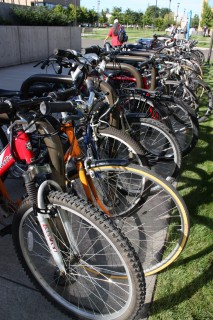This content was published: February 29, 2012. Phone numbers, email addresses, and other information may have changed.
Cascade Campus launches Bike Rental Program for students
Photos and story by Abe Proctor
Thanks to a new initiative from student leaders at Cascade Campus, riding your bike to school just got easier than it’s ever been before. This January, the Associated Student of Portland Community College (ASPCC) – Cascade launched PCC’s first-ever bike rental program. For a fee of $15, students can use a newly-refurbished bicycle for an entire academic term.
“We wanted to make Cascade a more bike-friendly campus,” said Julie Davenport, ASPCC – Cascade’s communications coordinator and the architect of the bike rental program. “This seemed like a really straightforward and affordable way to do it.”
The program was funded by a grant from the ASPCC’s Green Initiative Fund, which supports projects aimed at making PCC a more sustainable institution.
Davenport’s interest in starting a bike rental program at Cascade arose from her service on PCC’s Transportation Demand Management (TDM) committee, which is charged with investigating and developing ways that the College can meet the transportation needs of students, faculty and staff while reducing the use of single-occupancy vehicles. Bicycles, of course, are a prime component of a successful TDM campaign.
“My motivation came from going to TDM meetings,” Davenport said. “It made me much more aware of our transportation problems. I asked myself, ‘How can we encourage more Cascade students to leave their cars behind? How can we make it feasible for students who are struggling financially?’ ”
The answer seemed clear: find an inexpensive way to make more bicycles available to Cascade students.
In order to learn more about how Cascade might set up its bike rental program, Davenport looked to the University of Oregon, where a successful and popular bike rental program has been running for three years. Davenport learned quite a bit during her visit, but quickly saw that she would need to make some changes if the program were to work at Cascade.
First, the program needed to be more affordable to students. The U of O program has a per-term rate comparable to Cascade’s, Davenport said, but with a considerable up-front deposit also required. A big part of lowering the program’s cost to students, she realized, would be finding relatively inexpensive bicycles. This led her to the second big change – the formation of community partnerships.
Davenport worked with the Community Cycling Center, a Northeast Portland-based nonprofit, to purchase the bike rental program’s initial fleet of 20 bicycles. The bikes are all recently refurbished and in top working order, and are outfitted with lights, fenders, bag racks, helmets, and U-locks – everything a Portland cyclist needs to get around, in fair weather or foul.
“These are fully functional, fine-tuned bikes,” Davenport said. “Our students can count on them to work well.”
Davenport reached further into the community to outfit the bikes. The helmets were obtained at a discount from an organization called Trauma Nurses Talk Tough (and provided for free to students), while the accessories were provided – at cost – by local firms Portland Design Works and Cyclone Bicycle Supply. The savings, she said, are being passed on to students.
To help students keep their bikes properly maintained – and to learn to do the maintenance themselves – Davenport set up a partnership with Bike Farm, a Northeast Portland-based nonprofit bike maintenance collective. Each Cascade bike rental comes with a Bike Farm membership, which (among other things) entitles students to supervised “stand time,” in which Bike Farm volunteers instruct them in basic bicycle maintenance.
All the community partners were excited to help get the bike rental program off the ground, said Davenport.
“It’s been awesome,” she said of working with the program’s partners. “Everyone thought it was a great idea and really helped us out. We couldn’t have got this program off the ground without the support of the community.”
Once she had lined up and outfitted her fleet of bikes, Davenport turned her attention to finding a place to store them – not an easy task on an already-crowded campus, let alone one that will soon undergo a massive bond-funded construction program. For the time being, the bikes are being stored in and rented out from the former Paragon building on North Killingsworth Street, a property owned by PCC.
In addition to the 20 bikes now on hand, Davenport hopes to add 30 more by the start of Spring Term 2012. The new bikes will come courtesy of the Portland Police Bureau, which is donating them from its store of excess impounded bicycles. Eventually, she would like to round the fleet out to an even 100 bikes, and possibly find a permanent space to house the program.
“My dream would be to have a streetfront space for a rental and repair shop,” she said, smiling, “and have a bike mechanic on the ASPCC staff.”
To learn more about the Cascade bike program, visit www.pcc.edu/resources/aspcc/cascade/BikeProgram or call 971-722-5575.
